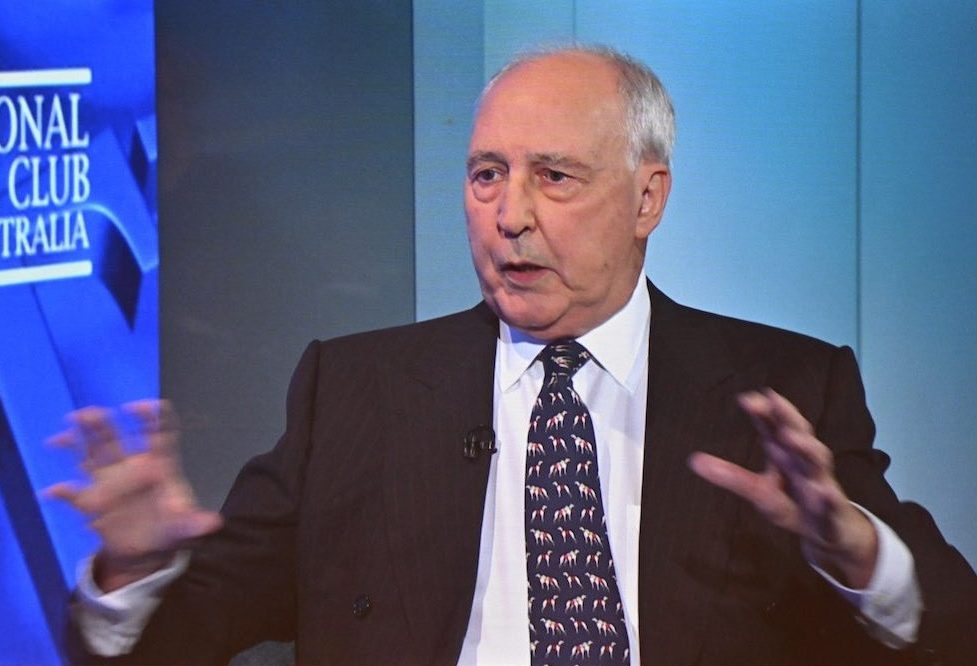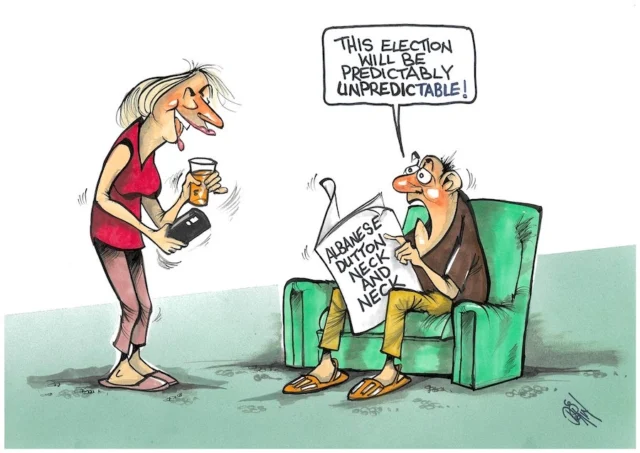
The latest vitriolic exchange reflects the long-running policy animosity between the two, particularly Keating’s hostility to Wong over the issue of China, writes MICHELLE GRATTAN.
FORMER Prime Minister Paul Keating has launched an extraordinary fresh barrage of criticism against Foreign Minister Penny Wong, accusing her of delivering “platitudes” in her major foreign policy speech on Monday.
In a statement shortly after Wong addressed the National Press Club on “Australia’s interests in a regional balance of power”, Keating said she had provided no policy answers and had adopted the “binary” approach – in her case favouring the US against China – that she warned others to avoid.
“Never before has a Labor government been so bereft of policy or policy ambition,” he said.
Earlier, answering a question about Keating’s recent cutting description of her “running around the Pacific Islands with a lei around her neck” handing out money, Wong said the former PM had “diminished” his legacy and the subject.
The latest vitriolic exchange reflects the long-running policy animosity between the two, particularly Keating’s hostility to Wong over the issue of China.
In her address, Wong condemned commentators and strategists who viewed what was happening in the region “simply in terms of great powers competing for primacy.
“They love a binary. And the appeal of a binary is obvious. Simple, clear choices. Black and white. But viewing the future of the region simply in terms of great powers competing for primacy means countries’ own national interests can fall out of focus.
“It diminishes the power of each country to engage other than through the prism of a great power.”
Wong stressed the need for countries “with an existential interest in regional peace and stability to press for the responsible management of great power competition”.
She said “strategic competition is not merely about who is top dog, who is ahead in the race, or who holds strategic primacy in the Indo-Pacific.
“It’s actually about the character of the region. It’s about the rules and norms that underpin our security and prosperity, that ensure our access within an open and inclusive region, and that manage competition responsibly.”
She said Australia employed its own statecraft “toward shaping a region that is open, stable and prosperous.
“A predictable region, operating by agreed rules, standards and laws. Where no country dominates, and no country is dominated. A region where sovereignty is respected, and all countries benefit from a strategic equilibrium.”
In her speech, Wong flagged she would not be drawn into discussion of timelines and scenarios about Taiwan. That was “the most dangerous of parlour games”.
“A war over Taiwan would be catastrophic for us all,” she said; “our job is to lower the heat on any potential conflict”.
Wong said of the China relationship, “the Albanese government will be calm and consistent”, co-operating where it could, disagreeing where it must and managing differences wisely. “We start with the reality that China is going to keep on being China.”
She said that in the pursuit of “strategic equilibrium with all countries exercising their agency to achieve peace and prosperity, America is central to balancing a multipolar region. Many who take self-satisfied potshots at America’s imperfections would find the world a lot less satisfactory if America ceased to play its role.”
Keating said: “In facing the great challenge of our time, a super-state resident in continental Asia and an itinerant naval power seeking to maintain primacy – the foreign minister was unable to nominate a single piece of strategic statecraft by Australia that would attempt a solution for both powers”.
Keating said Wong “went out of her way to turn her back on what she disparaged as ‘black and white’ binary choices, speaking platitudinally about keeping ‘the balance of power’, but having not a jot of an idea as to how this might be achieved.”
Wong had said she was “steadfast” in refusing to talk about regional flashpoints – “that is, refusing to talk about the very power issue which threatens the region’s viability.
“She told us she will turn her back on reality, speaking only in terms of ‘lowering the heat’ and the ‘benefit from a strategic equilibrium’, without providing one clue, let alone a policy, as to how that might be achieved”.
While Wong had eschewed “black and white” binary choices, she had then made such a choice herself, Keating said.
She had extolled the virtues of the US, “of it remaining ‘the central power’ – of ‘balancing the region’, while disparaging China as ‘intent on being China’”.
She had gone on to say “countries don’t want to live in a closed, hierarchical region, where the rules are dictated by a single major power to suit its own interests”, Keating said.
“Nothing too subtle about that,” he said. “She means China and is happy to mean China.
“This is the person claiming she does not wish to make binary choices. Yet tells us ‘we have to press for the management of great power competition’, while saying, ‘we want partners and not patriarchs’ but articulating not a jot of an idea of how that great power competition can be settled without war.”
Keating, who has been a strong critic of AUKUS, said Wong had said the advent of capability under AUKUS “will ‘change the calculus for any aggressor’ – of course, meaning China”.
“As a middle power, Australia is now straddling a strategic divide, a divide rapidly becoming every bit as rigid as that which obtained in Europe in 1914. Australia’s major foreign policy task is to soften that rigidity by encouraging both the US and China to find common cause and benefit in a peaceful and prosperous Pacific,” Keating said.
“Nothing Penny Wong said today, on Australia’s behalf, adds one iota of substance to that urgent task.”![]()
Michelle Grattan, Professorial Fellow, University of Canberra. This article is republished from The Conversation.
Who can be trusted?
In a world of spin and confusion, there’s never been a more important time to support independent journalism in Canberra.
If you trust our work online and want to enforce the power of independent voices, I invite you to make a small contribution.
Every dollar of support is invested back into our journalism to help keep citynews.com.au strong and free.
Thank you,
Ian Meikle, editor








Leave a Reply